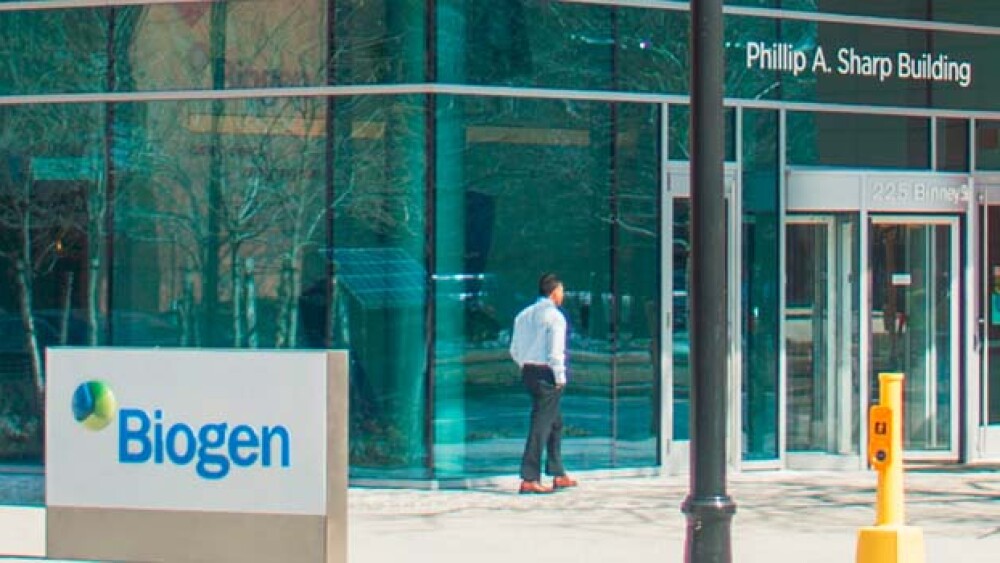“ALS is a disease you really want to make a difference in,” Toby Ferguson Biogen’s senior medical director for Neuromuscular Research and Early Development told BioSpace.
Amyotrophic lateral sclerosis (ALS) is a devastating disease with no approved treatments. Diagnosis is tantamount to a death sentence and researchers are desperately searching for some kind of therapy. Although there have been numerous failed treatments, Biogen believes it might be on the right track.
“ALS is a disease you really want to make a difference in,” Toby Ferguson, M.D., Ph.D, Senior Medical Director for Neuromuscular Research and Early Development at Biogen told BioSpace.
Earlier this month, Biogen announced interim results from a Phase I/II study of tofersen, an antisense oligonucleotide the company licensed from Ionis Pharmaceuticals that is being studied as a potential treatment of ALS patients who have a confirmed superoxide dismutase 1 (SOD1) mutation. The interim results showed both a proof-of-biology and proof-of-concept, which supported the start of a Phase III clinical trial to confirm the efficacy and safety of tofersen in that patient population, Ferguson said. Ferguson said this was exciting news as it showed the potential of tofersen to target the genetic driver of this form of ALS.
There have been numerous failures to develop therapies for ALS, a fatal neurodegenerative disease characterized by motor neuron loss in the brain and spinal cord that is responsible for controlling voluntary muscle movement. Earlier this month South San Francisco-based Cytokinetics reported its Phase II ALS drug reldesemtiv failed to hit endpoints. Cytokinetics isn’t alone in that. Ferguson noted that Biogen has also missed the mark in previous ALS studies.
As more drugs seem to miss the mark, Ferguson said many researchers, such as Biogen, are taking closer looks at targeting specific genetic drivers, like SOD1. He said the approach is much like oncologists use in treating the various mutations in cancer. By going after the genetic forms of the disease, he said that may improve the odds of developing a therapeutic for the dreaded disease. There is a growing body of evidence that mutations within multiple genes are believed to cause ALS, Ferguson added. ALS with SOD1 mutations is a rare subtype of familial ALS and accounts for approximately two percent of all ALS cases.
The interim results showed that a 100 mg treatment with tofersen, administered through a lumbar puncture, over a three month period resulted in a statistically significant lowering of SOD1 protein levels in the cerebrospinal fluid. Researchers found that the patients who were given 100 mg of the experimental drug had a 37 percent reduction of the SOD1 protein in spinal fluid when compared to 12 people who received the placebo, Ferguson said.
Additionally, those patients on the higher dose scored better on the ALS Functional Rating Scale-Revised that measures breathing capacity, muscle strength, and how well people functioned on activities, in comparison to placebo. Specifically, Biogen said the mean change in ALSFRS-R score from baseline to Day 85 was -1.1 in the tofersen 100 mg group compared to -5.3 in the placebo group, on a 48-point scale, the company said. Looking at the results, Biogen said the across clinical measures, the benefits of treatment with tofersen was most apparent in patients with fast progressing forms of the disease. The company added that given the short duration of treatment, the observed difference between 100 mg and placebo-treated patients was more apparent in patients with rapidly progressing SOD1 ALS.
The Phase III VALOR study in adults with ALS with a confirmed SOD1 mutation has already seen its first patients dosed, Ferguson said. The VALOR study will assess the efficacy and safety of tofersen versus placebo, with a primary endpoint based on the ALSFRS-R score.
That’s good news for ALS patients, as well as Biogen, which is still reeling from its disappointing Alzheimer’s disease trial. Ferguson noted that tackling these difficult to treat neurodegenerative diseases is at the core of Biogen’s research. While failures are disappointing, Ferguson said the researchers are able to learn a little bit more about treatment options and will be able to take that data and build on it for future treatment options.
In addition to tofersen, Biogen has several other assets in its pipeline aimed at differing forms of ALS. With ALS being a core therapeutic area for the Boston-based company, Ferguson said Biogen wants to bring around multiple assets in order make a difference in the lives of patients with ALS.





